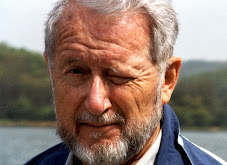Essay 28
ROADS AND THE STANDARD OF LIVING
While on a trip to a somewhat remote part of Turkey, I learned that the United States had funded some power generating plants in that region, and that available electricity was beginning to have a significant effect. There is no doubt that such activity represents progress, and impressive progress, too. I'm sure that such U.S. aid was well received.
But I observed, as I traveled along a moderately acceptable road in the rural regions not too far from the power plant, that many people had hauled their agriculture products to the sides of the road, and were awaiting customers. Some were in animal-drawn carts, but others were afoot. There were few dwellings within sight of the road, suggesting that most people had come a considerable distance. Many were well removed from any village or city.
Both of my grandfathers arrived on the Kansas Plains in l870s, miles from anywhere. One of my maternal grandfather's early visions was to have the railroad come near the homestead, and he labored for more than a decade to accomplish that. As a member of the State Legislature he fought for a rail network throughout the state, and the main line of the Santa Fe Railroad now runs but a mile from his original homestead. Among other endeavors, he organized a number of farmers to raise $700 to pay for a railroad spur at the closest approach--and that became my home town. Hence my parents grew up with a railroad nearby, but only used horses for power. A quarter of a century later, when I was growing up, we had tractors and other power machinery, and a standard of living that was relatively high. But my father oft-times pointed out to me that tractors and other machinery were not solely responsible for our wealth, nor could it have been electricity, since that arrived on the farm five years after World War II. Rather it was due to our access to roads, not only in our local area but also across the nation.
So at an early age I began to understand my grandfathers' and father's great interest in roads and railroads, their concern for their maintenance, and their eagerness to reestablish them after storms or floods. They knew that without means to transport agricultural products to the consumer, there was no need to grow more than we could consume ourselves, and no possibility of buying other products we might like to have.
Is it possible that support to Turkey from the U.S. might have been allocated better, first to roads, and then to power generators?
Roads into space will almost certainly determine the development of space, rather than the reverse. For wealth to be realized, and then shared, distribution networks must necessarily exist. Many kinds of secondary activities, interests and occupations will spring up along the roadsides of such systems, and eventually those "secondary" locations will become prime ingredients in a mature, functioning, wealthy, societal network. Commerce which can make wealth, integrates. The lesson, as experienced in the U.S., might be summarized as follows:
1) Fight for roads--lots of them.
2) Build as many as you can, almost before anything else. Use government
subsidies, and private investment.
3) Be amazed at the unexpected wealth that flows along them.
A final observation. The community at the end of a dead-end road is rare, expensive to live in and to maintain, and is almost certainly of a temporal nature. Ironically, this is the situation of Los Alamos!
Saturday, September 27, 2008
Subscribe to:
Post Comments (Atom)


No comments:
Post a Comment